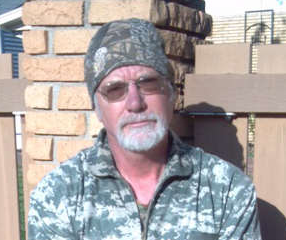
Sometimes as I conjure up Google or check Fox News or the 7-day weather forecast on my smart phone, all while sitting in the Walmart parking lot, I wonder how we ever survived with phones that were only made to talk on. Then it hits me; we survived quite well, thank you very much.
The other day I went to fill the deer feeder in the draw below our high-rise deer blind which we built several years ago. As I’ve stated before in other columns, if it were only me hunting, I probably would not have gone to such lengths. But the hunting and outdoor experiences it has provided Joyce and I and other family members has made it all worthwhile. So, how would I hunt deer if I were only me hunting?
For those of you new to deer hunting that don’t have a blind from which to hunt, or for those of you wanting to try hunting deer for the first time but are not sure how to proceed without a blind, let me give you some tips from my experience.
Mr. Webster defines the word camouflage as “a disguise or deception; to disguise in order to conceal.” Camouflage does not have to make something or someone entirely disappear, it just has to make them blend in, and it does that by breaking up their outline. Examples of that would be sitting against a tree or sitting behind or under some broken overhanging limbs. Both choices camouflage you by breaking up the outline of your body. I have harvested more deer from a folding camp chair tucked beneath a cedar tree than from any other way. Joyce harvested her first deer ever as she sat on a camp chair behind a log in a big thick tree row. My point is that in the absence of a blind of some description, nature will provide you everything you need if you just learn to see it.
The most important element of hunting is to position yourself where there is game. So, when deciding upon a deer hunting location, choose a spot near a well-used deer trail, where deer enter and exit a woodlot etc. If you’re bow hunting, you want to be as close to the trail as possible, but if rifle hunting, choose a spot away from the trail seventy-five to a hundred yards or so. Then pay attention to where the sun will be in relation to you. You do not want the sun shining directly on you or in your eyes when it rises or sets, making it hard to see ahead of you as it shines into your eyes or lighting you up like a Christmas tree as it shines on you. Next, look around you for anything that will conceal your form, like a broken-over or uprooted tree, a tree with large broken limbs that hang to the ground or a big cedar tree with long outstretched branches. Once you have found a natural blind, figure out how best to use it. Prune and remove limbs and branches until you can tuck yourself into whatever concealment you’ve chosen. Prune away only enough to allow you entrance and to give yourself an open shooting lane. Use your imagination and move limbs and branches around if necessary to accomplish what you need. If you are firearm hunting, find a way to support your firearm. If none exists naturally in your new natural blind, a couple 1-inch x 2-inch pieces of lumber bolted together near one end opens up into an “x” to make a cheap and dandy shooting stick to cradle your gun. Your seat can be whatever you want. If you’re young you can probably get away with sitting on a log, but my choice is a cheap folding camp chair that gives me a back to lean against. It’s not always possible, but choosing to tuck yourself in amongst the branches of a big cedar tree will often help protect you from the north and west wind also, and the strong, pungent cedar scent will be a natural cover-scent.
There are still plenty of ways to conceal yourself to harvest a Kansas deer without a hunting blind or tree stand. Be creative; tree limbs stacked against a fence, a piece of camouflage fabric stretched around some fence posts, even digging yourself down into an old round hay bale at the edge of a field will all fill the bill. The end result might even be more fulfilling knowing you used what God provided to fill your freezer. Continue to Explore Kansas Outdoors!
Steve Gilliland, Inman, can be contacted by email at stevenrgilliland@gmail.com.






